The statistics are staggering. Osteoporosis is responsible for two million broken bones every year in the U.S. and causes 75,000 deaths, according to the National Osteoporosis Foundation. Most people don’t know they have it until they break a bone.
During May, National Osteoporosis Month, health providers at the University of Nebraska Medical Center and Nebraska Medicine, are bringing attention to osteoporosis.
“About half of future bone breaks can be prevented by intervening with treatment,” said Laura Graeff-Armas, M.D., University of Nebraska Medical Center associate professor of internal medicine and a Nebraska Medicine endocrinologist who specializes in osteoporosis and conditions that cause bone loss. “Breaking bones is a warning sign that you have osteoporosis or pre-osteoporosis. I’m seeing some patients at their second or third fracture — fractures that needlessly occurred because osteoporosis wasn’t diagnosed or treated.”
Osteoporosis, often called a silent disease because there are no obvious symptoms of bones getting weaker, is a disease of decreased bone strength and low bone mineral density that increases the risk of breaking a bone. It’s estimated that one in three women and up to one in five men over age 50 will break a bone due to osteoporosis.
It’s a major cause of death and disability, yet nearly 80 percent of older Americans who suffer bone breaks are not tested or treated for osteoporosis.
Dr. Graeff-Armas said women should be screened for osteoporosis at 65 years old and men at 70. Screening involves simple tests.
“Osteoporosis is a universal problem,” Dr. Graeff-Armas said. “A lot of times, people don’t know about osteoporosis or they don’t know they have it. We come up with a plan to prevent them from breaking another bone.”
She and orthopaedic surgeons at Nebraska Medicine collaborate to encourage more patients to get an osteoporosis evaluation with the idea of preventing broken bones in the future.
Patients over 50 years old who’ve broken a bone or have been diagnosed with osteoporosis are referred to Dr. Graeff-Armas. Patient visits may include reviewing a patient’s nutrition, laboratory tests, and dual-energy X-ray absorptiometry (DEXA) scan then going over a patient’s options. Treatment may include medication.
After 73-year-old Mina Duncan of Omaha lost her husband, she said she became more aware of the kind of life she wanted to live. She is getting treatment for her osteoporosis, which runs in her family.
“My mother broke her hip, which first made us aware. I have two daughters, and they both know how important exercise is to help maintain their bone strength. I’m part of a huge family and I want to be here to spend time with my kids and grandkids. Part of the training they give us at Nebraska Medicine is really helpful – I’ve learned so many great tips to help manage my osteoporosis.”
She also takes medication that maintains bone density and helps prevent fractures.
“If you look at your total health, all those pieces of the puzzle go together,” Duncan said. “It’s really important to have a conversation with your doctor about osteoporosis. I walk a lot to stay healthy. When I go to the grocery store, I’ll park far away, and then walk down every single aisle in the store. Physically, my body can tell when I don’t exercise.”
Several other physicians see patients statewide through Nebraska Medicine Telemedicine Outreach Clinics at: Columbus Community Hospital in Columbus; Fillmore County Hospital in Geneva; Marry Lanning Healthcare in Hastings; Regional West Medical Center in Scottsbluff; Crawford County Memorial Hospital in Denison, Iowa; Montgomery County Memorial Hospital in Red Oak, Iowa; and Burgess Health Center in Onawa, Iowa.
Those at higher risk for bone loss and osteoporosis have a family history of osteoporosis, are smokers, have a small build and are underweight, those with an eating disorder, post-menopausal women, those who drink alcohol, and those with a sedentary lifestyle and inadequate calcium and vitamin D intake.
For more information about osteoporosis go to https://www.nof.org/national-osteoporosis-month/. Call 800.922.0000 to make an appointment for an osteoporosis screening, or visit NebraskaMed.com/Womens-health/osteoporosis to learn more about osteoporosis treatment at Nebraska Medicine.
We are Nebraska Medicine and UNMC. Our mission is to lead the world in transforming lives to create a healthy future for all individuals and communities through premier educational programs, innovative research and extraordinary patient care.
